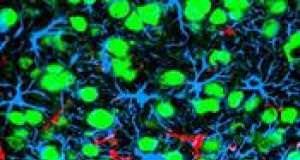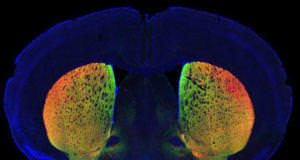Brain Damage Triggered By Mini-Strokes Detailed
A new study appearing December 12 in the Journal of Neuroscience details for the first time how "mini-strokes" cause prolonged periods of brain damage and result in cognitive impairment. These strokes, which are often imperceptible, are common in older adults and are believed to contribute to dementia.
Even The Smallest Stroke Can Damage Brain Tissue And Impair Cognitive...
Blocking a single tiny blood vessel in the brain can harm neural tissue and even alter behavior, a new study from the University of California, San Diego has shown. But these consequences can be mitigated by a drug already in use, suggesting treatment that could slow the progress of dementia associated with cumulative damage to miniscule blood vessels that feed brain cells.
The team reports their results in the Dec. 16 advance online edition of Nature Neuroscience.
Silent Stroke Can Cause Parkinson’s Disease
Scientists at The University of Manchester have for the first time identified why a patient who appears outwardly healthy may develop Parkinson's disease.
Whilst conditions such as a severe stroke have been linked to the disease, for many sufferers the tremors and other symptoms of Parkinson's disease can appear to come out of the blue. Researchers at the university's Faculty of Life Sciences have now discovered that a small stroke, also known as a silent stroke, can cause Parkinson's disease. Their findings have been published in the journal Brain, Behavior, and Immunity.
Can Worms Alleviate Autism?
A growing body of evidence suggests that in some patients, increased inflammation contributes to autistic behaviors. Now, a Phase I clinical trial is under way to measure the effects of infecting autistic patients with a non-pathogenic parasitic worm. Scientists at Montefiore Medical Center at the Albert Einstein College of Medicine in New York and biotech company Coronado Biosciences will test the hypothesis that treating these patients with Trichuris suis, a non-pathogenic parasitic pig whipworm, will dampen their immune responses and ameliorate repetitive and irritable behaviors.
Common Medications Shown to Impair Memory, Cognitive Performance in Elderly
Are you elderly and having memory or concentration problems? They might be caused by common medications used to treat insomnia, anxiety, itching or allergies,...
Can Magnesium Magnify Brain Power?
A magnesium supplement thought to improve brain functioning gets a small clinical trial.
Exercise Makes Middle-Aged People Smarter
High-intensity interval training makes middle-aged people not only healthier but smarter, showed a Montreal Heart Institute (MHI) study led by Dr. Anil Nigam of the MHI and University of Montreal, in collaboration with the Montreal Geriatric University Institute.
Omega-3 Intake Heightens Working Memory in Healthy Young Adults
While Omega-3 essential fatty acids -- found in foods like wild fish and grass-fed livestock -- are necessary for human body functioning, their effects on the working memory of healthy young adults have not been studied until now.
Diabetes Raises Levels Of Proteins Linked To Alzheimer’s Features, Study Finds
Growing evidence suggests that there may be a link between diabetes and Alzheimer's disease, but the physiological mechanisms by which diabetes impacts brain function and cognition are not fully understood. In a new study published in Aging Cell, researchers at the Salk Institute for Biological Studies show, for the first time, that diabetes enhances the development of aging features that may underlie early pathological events in Alzheimer's.
Challenging Parkinson’s Dogma: Dopamine May Not Be The Only Key Player...
Scientists may have discovered why the standard treatment for Parkinson's disease is often effective for only a limited period of time. Their research could lead to a better understanding of many brain disorders, from drug addiction to depression, that share certain signaling molecules involved in modulating brain activity.
Exercise The Body To Keep The Brain Healthy, Study Suggests
People who exercise later in life may better protect their brain from age-related changes than those who do not, a study suggests.Researchers found that people over 70 who took regular exercise showed less brain shrinkage over a three-year period than those who did little exercise.
Chewing Ability Linked To Reduced Dementia Risk
Can you bite into an apple? If so, you are more likely to maintain mental abilities, according to new research from Karolinska Institutet in Sweden. The population is aging, and the older we become the more likely it is that we risk deterioration of our cognitive functions, such as memory, decision-making and problem solving. Research indicates several possible contributors to these changes, with several studies demonstrating an association between not having teeth and loss of cognitive...


















